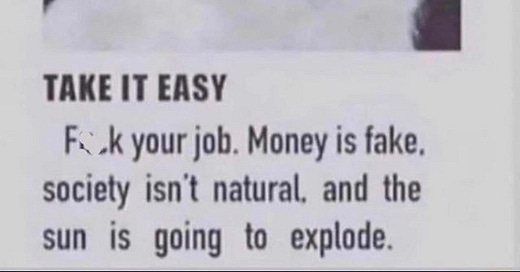"There has to be something between being a hippie-dippy child of the earth and a full-blown sellout, right?"
M's words stung.
We were discussing a decision our friend L was making. She could either stay in her current, very cushy job or quit to take a year-long sabbatical. L's world was rife with contradictory desires. There is something very heady and intoxicating about experiencing work validation and success. Still, something in her also desired a softer life. So she almost quit it all but then didn't.
But L is not a sellout. Like a lot of us, she was born and raised into a world underpinned by commerce. It is, by design, somewhat extractive, cutthroat, and transactional. The polarity of M's hippy/sellout framing is simply a testament to how we all experience it.
Finding meaning, purpose, joy, and sustenance, and then striving to maintain our decency within the confines of this system, has become our life's work. It's a rite of passage—an existential malaise that typifies life as a certain kind of 30 or 40-something in 2024.
I've lost track of the numerous wistful, lamenting conversations about work and purpose I've recently shared with colleagues and peers. The consensus amongst 9-to-5 workers is clear: We are exhausted. And we yearn for a three-month holiday we've yet to take.
But this is a distinct type of exhaustion - it is dissociative because it exists in privilege. It is arguably the best time in history to be alive. And the 9-5ers represent the 1%. We're not grinding away in the fields like our ancestors did. We mostly chat over a drink at each other's houses about therapy and how tired we are.
I suspect this comes from a highly activated intra-personal world. It could be a brand of success we were marketed and wrestle with. And maybe some of it is a generational inheritance - where we are finally making the space and time to confront the visceral weariness our parents were too busy to feel.
There's a self-awareness to this pain. My friend S can identify when his thoughts are lathered with anxiety. And all T can talk about these days is how our identities are weakly held together by our job titles and affiliations. As a generation, we have the gumption and the vocabulary to admit that we're tapped out from constantly demonstrating our value and calibrating our confidence.
I think about what a reframe might look like. Because this existential quagmire is steeped like stale tea. M is right; there must indeed be a different way.
We work for many reasons. As colorless as it might be, work gives us a sense of self. It provides stability to our lives. It pays the bills and fills our time. It allows us a way to introduce ourselves. And it's possible that not everyone is able to make a big leap and let all that go. Because this all feels very safe in our nervous system, and that is underrated.
It’s clear that for many, the solution won’t be as dramatic as quitting a job or taking a sabbatical—those are privileged choices that aren’t accessible to everyone.
My husband and I have been workshopping 'Designing Your Life' by Bill Burnett to reflect on some of this, and it's beginning to strike me that I'll need to figure a way to integrate a retreat type of life into my routine, rather than escape briefly every other month on holiday. There must be a way to integrate pieces of personal joy into our routine lives.
(Not that anyone asked, but here’s the TLDR of the book)
May be its okay to be both participants in and critics of the system. Democracy and all that. Good luck to us.





So completely agree with this essay. Our participantion in the system is inevitable, it is a matter of survival. But we must also retain perspective.
Quitting work may be a privilege few can afford but quitting *a way of working* does not always have to be so difficult. Sometimes it only needs a cold, hard look at one's priorities.
Apologies for going off on a rant. I never tire of writing/speaking about it. This is a topic close to my heart. 😅
Please let me know once you figure it out 😅